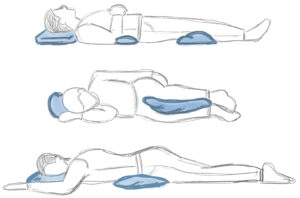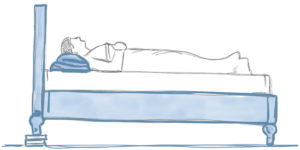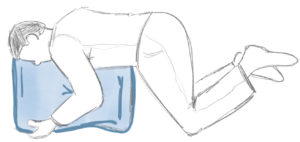
How to Sleep with Chronic Pain
This article was updated for accuracy and relevancy on January 12, 2022.
Sleeping with pain can be a nightmare. The best way to manage how to sleep with pain is to find the most comfortable sleep position. Luckily, we came across a great resource from the Wall Street Journal that we’ve summarized for you below, explaining some of the best sleeping positions for various types of pain. Enjoy… and then get some rest!
Connection Between Sleep and Pain
What is the connection between poor sleep and pain? It turns out that sleep deprivation affects the brain’s pain-killing response. A group of researchers tested the pain threshold of participants after a good night’s sleep and without. The results from their test indicate that the participants had lower pain sensitivity when they had better sleep and the opposite when they experienced sleep deprivation.
In short, sleep quality affects your pain receptors, making you more sensitive to pain and increasing pain intensity. So, aside from figuring out what is the best sleep position, you should also find ways to deal with sleep disturbance to get healthy sleep.
Best Sleeping Position for Shoulder Pain
Try to avoid sleeping on the side of your body with the painful shoulder. Instead, it may help to sleep on your back. If you can’t sleep on your back, sleep on the side without any shoulder pain and put a large pillow at chest height and hug it.
Best Sleep Position for Back Pain
First, try laying on your back with a pillow under your knees and a rolled towel under the small of your back. This should help maintain your spine and body’s natural curve and is recommended by experts to prevent lower back pain. If you need to sleep on your side, put a pillow between your knees (also good for hip and knee issues). Sleeping on your stomach isn’t ideal for back or neck pain, but if you have to, put a pillow under your pelvis and lower abdomen to help reduce strain.

Best Sleeping Position for Neck Pain
Keeping the neck in a neutral position is key if you have neck pain or want to avoid a stiff neck. It’s best to avoid sleeping on your stomach. To keep your neck in a neutral position, experts recommend keeping the pillow above your shoulders or using a rolled-up hand towel to support the base of your neck.

Best Sleep Position for Plantar Fasciitis
The key to sleeping with Plantar Fasciitis is to keep your feet and ankles in a relaxed position. Also, you’ll probably want to avoid tucking the sheets in too tightly.

Sleeping with Acid Reflux
This one isn’t exactly related to chronic pain, but we threw it in as a bonus – because trying to sleep with acid reflux can be tough. Elevating the head is what experts recommend to help you sleep with acid reflux. You can use pillows under your head, or you can even place bricks under the front legs of your bed to prop yourself up. Sleeping on your side may also help you get a better sleep.

Best Sleep Position for Shoulder Impingement
For those who aren’t familiar, shoulder impingement is an injury wherein the rotator cuff rubs on nearby tissue, causing the affected area to swell. People with shoulder impingement should be sleeping on either their stomach or back, not on their side. But if you’re like most people, you might switch positions while sleeping. So, if you are worried about sleeping on your side without knowing, you can alleviate the weight of the affected shoulder and keep your hips aligned by putting a pillow between your legs. This may help you get a good sleep and excellent pain relief.
We hope that helps!
Finding the right position is not enough when dealing with more severe pain. It might also make sense to get a new mattress, as sometimes your mattress can be too soft or too firm. You also need more strategic rehabilitation physical therapy exercises. If your pain persists or if you’d like to get a checkup from one of our highly-trained physical therapists at Ivy Rehab Physical Therapy, you can request an appointment here. Sleep tight!
Article by: Holly Lookabaugh-Deur, PT, DSc, GCS, CEEAA
Director of Clinical Services, Ivy Rehab Network
Holly Lookabaugh-Deur, PT, DSc, GCS, CEEAA is a practicing physical therapist and a partner and Director of Clinical Services at Ivy Rehab Network. Deur is board certified as a geriatric clinical specialist and certified exercise expert for aging adults with more than 35 years of clinical experience. She is certified as an aquatic and oncology rehabilitation specialist and serves as adjunct faculty at Central Michigan University and Grand Valley State University.
The medical information contained herein is provided as an information resource only, and does not substitute professional medical advice or consultation with healthcare professionals. This information is not intended to be patient education, does not create any patient-provider relationship, and should not be used as a substitute for professional diagnosis, treatment or medical advice. Please consult with your healthcare provider before making any healthcare decisions or for guidance about a specific medical condition. If you think you have a medical emergency, call your doctor or 911 immediately. IvyRehab Network, Inc. disclaims any and all responsibility, and shall have no liability, for any damages, loss, injury or liability whatsoever suffered as a result of your reliance on the information contained herein.
